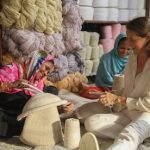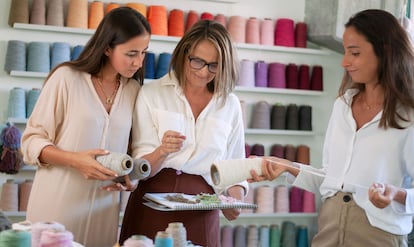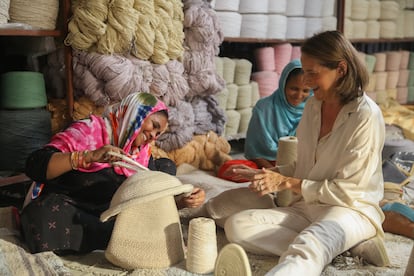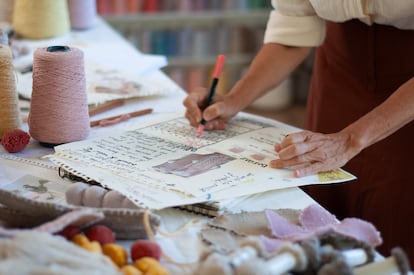


For Lorena Canals (Barcelona, 62 years old), the birth of her first daughter changed her life completely. And not only because of the complete vital transformation that motherhood entails, but because of a particular need motivated by this birth, the foundations were created for what would become her business, a carpet brand that this year celebrates its 25 years of existence.
It all started when Canals looked for a children’s rug suitable for the washing machine for her daughter, but after much research she found nothing on the market. Far from resigning herself, she decided to make it herself: “I was inspired by a little dress with some waves that my daughter owned, the rug was called Cookie and, in fact, it is still in our catalog and we continue to sell it. I think it is the best-selling in units of the entire catalog, because it has been around for 25 years,” says Canals, founder of her eponymous firm.
The company boasts that it was the first washable children’s rug in the world. The design, made of cotton, came from the garage of Canals’ own home, a resident of the Barcelona town of Sant Just Desvern. That garage of just eight square meters became a small office from which to sell the rugs, but that base of operations soon became too small. “First I took over a small store and went on weekends with my daughters and my husband to place orders. Then a larger store in a building full of stores, and in the end we ended up having seven stores because we couldn’t fit. Finally, we arrive at the warehouse we currently have, which is in Sant Just Desvern,” he tells of his evolution in conversation with EL PAÍS. What was forged as a one-person business mutated into a family business; Canals’ husband is currently the financial director of Lorena Canals and her daughters are also involved in the brand, although they have their own company, Oli&Carol, a brand of ecological toys for babies.
The business was going smoothly when the economic catastrophe of 2008 threatened to turn the income statements red. It was then that the brand’s great international leap arrived, which found in exports the dreamed antidote to the decline in national sales. Canals remembers that before “the company was much smaller” and that “a gigantic world opened up” when they also chose to sell the rugs outside of Spain. Currently, a team of 42 people works in the province of Barcelona, part of which manages the United States market, its main buyer. In that country they have their own warehouse in the State of New Jersey. But the internationalization of the Catalan brand does not stop there, far from it.

More than a decade ago, Lorena Canals decided to open its own factory in India, where all its rugs and textile decoration objects are made. “For me it is one of the things I am most proud of,” she explains and adds, perhaps because of the controversy that always surrounds the fragile labor rights of workers in that country, that the factory employees have “a day of eight hours with a break for lunch.” In addition, the company opened a nursery school for underprivileged children in the Asian country, with the aim of facilitating their access to education, in addition to providing them with two meals a day. “We open the doors in the morning, the child who wants comes in regardless of his age and we have two teachers who teach classes,” he says about this initiative, called Project Sakûla. More than 200 people are part of the factory staff, where artisans specialized in different techniques shape Lorena Canals rugs.
Since that first washing machine mat created a quarter of a century ago, its references have multiplied to reach 750 products. Throughout this time they have patented washable wool under the label woolablea milestone with which they have once again become pioneers in the sector with, according to the brand, the first washable wool rug on the market.
Beyond the rugs
The company has not limited itself to its successful rugs. Like any company focused on attracting new audiences, the catalog has diversified over time without losing focus on sustainability, a key pillar in its philosophy. Precisely to underline this commitment to the environment, a few months ago they launched a line of sustainable toys made with leftover textiles from carpets. “During Covid I spent three years without going to the factory, when I returned I don’t know if I was a different person or the coronavirus changed us all, but I realized that I had a lot of remains. We sent them to be recycled, but there were remains of a lot of fabric or colors that had been dyed poorly or that had not turned out well. That’s when it occurred to me to make a line of sustainable toys.”

They traveled to the prestigious Maison&Objet fair in Paris to present it and the reception could not have been better because Harrods wanted to buy the toys to sell them in their legendary and luxurious department stores in London: “They were remodeling the toy plant because they want to remove everything that is plastic and there we were able to fit in, I was very excited because it is a risk, you never know if the end customer is going to understand it and that Harrods stopped and bought it for us was a great start,” says proud Canals, who claims to have special affection for this release, as it reminds him of when he made toys by hand to give to his daughters for Christmas.
In addition to London and the United States, the brand’s commercial network extends throughout much of the globe and the perspective is to grow even more. “Our main market right now is the United States, in Brazil we have had a very good distributor for many years, we have also sold a lot in Greece for 15 years. Poland is a country that works very well and Belgium is also important,” the businesswoman lists. Reluctant to settle, she plans to multiply the sale of rugs by implementing a corner of the firm in selected stores in different countries: “In two years we will have about 200 or 250 corners around the world,” he says, and provides a piece of information that glimpses the potential of this new stage: “In Belgium, which was the first place where we began to implement the cornerssales have multiplied by 180″.

Being a leading brand in the sector, with all the visibility that entails, has a negative side and that is creative plagiarism. “The first time they copied me I cried all night, I was angry,” Canals admits. After speaking with his father, he decided to see the glass half full and now sees these plagiarisms as collateral “damage” to his success: “Maybe it’s maturity, I’m not telling you that I like it, but I consider that we are a source of inspiration for many brands. ”. With an annual growth of between 10 and 15% and a turnover of 10 million euros expected for this year, Lorena Canals celebrates its 25th anniversary as a brand by remembering a mantra that forces it to improve itself: “Selling rugs is not easy at all, It is a challenge.”